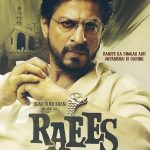The fact that ‘Lucknow Central’ is about a group of prisoners forming a music band as a part of their plan to escape from jail gives one an inkling of the fact that music will be an integral part of the film. Furthermore, one’s expectations rise up substantially when one sees Nikkhil Advani being credited as one of the producers as most of the film he has been associated with as a director or a producer has had good (‘Katti Batti’, ‘Jaane Kahaan Se Aayi Hai’) to outstanding music (‘Kal Ho Naa Ho’, Salaam-E-Ishq’). The music is scored by a bunch of young composers like Arjunna Harjaie, Tanishk Bagchi and Rochak Kohli.
Arjunna Harjaie, who has also done the background score for the film, opens the album with his recreation of “Kaavan Kaavan”, an old but popular Punjabi number most of us are familiar with. Though one has started getting wary of recreations, Arjunna’s version of this track comes across as a breath of fresh air as the composer has put in a lot of effort to make sure that even as the original tune or hook-line is retained, the track has some novelty value to it. The arrangements are very good and the song, despite being upbeat and having a celebration feel, has an emotional undercurrent running through it which makes it all the more enjoyable. On the contrary, Tanishk Bagchi’s version titled “Kaavan Kaavan (Remix)”, with EDM and hip-hop influences, is a complete mess.
Amit Mishra, who has been singing a variety of songs, channelizes his “Bulleya” avatar and along with Neeti Mohan, aces the Sufi-sque sound of Rochak Kohli’s “Meer-E-Kaarvan”. The orchestral arrangements by Ravi Singhal, consisting of a mix of contemporary and traditional instruments, support the tune well. Newcomer Adheesh Verma writes some soul-stirring lyrics that supplement the devotional quality of the song. Rochak succeeds in infusing an array of elements and influences to put together this track which, despite having a sufi-like vibe to it, makes one difficult to classify it under any genre. The track manages to keep you hooked till the last bit when you hear Amit and Neeti chant ‘chal akela raahi, hafiz tera ilahi‘.
Despite having a situational theme to it, “Teen Kabootar” has a very playful tune that keeps one thoroughly engrossed. The group of prisoners, led by Kishan (Farhan Akhtar), put up an impromptu, comical jam session in front of the Senior Officer (Ronit Roy). Mohit Chauhan and Divya Kumar understand the nuances of the situation well and accordingly, sing in a jovial and ludic manner. Kumaar’s lyrics and Raftaar’s rap portion accentuate the fun quotient of the track. The percussion sounds, heard throughout the song, compliment the energy of the song.
The best track on the album arrives in Arijit’s voice. “Rangdaari”, composed by Arjun Harjaie, has a nice amalgamation of a tune that evokes nostalgia and arrangements. The song talks about the subtle romantic feelings that Kishan (Farhan Akhtar) has for Gayatri (Diana Penty). The feeling of nostalgia comes across because of the tune which has an unmistakably old-world charm to it. The string instruments, flute, dholak and tabla lend a rich and voluptuous sound to the lovely tune. The way Arijit Singh extends the musical note at 1m 09s as the backup vocalist croons ‘rangdaari’ in the background is the highlight of the song.
“Baaki Rab Pe Chod De”, the last track on the album, has a situational feel to it just like “Teen Kabootar” but is sonically more appealing than the latter. Composer Tanishk Bagchi and lyricist Kumaar do well in amalgamating dialogue-based poetry and a thematic but engaging tune to create a track that succeeds in conveying a certain idea embedded within the narrative. The arrangements are quite nice; the gentle electric guitar riffs, sparsely used harmonium and percussion, which are heard predominantly throughout the song, compliment the partly fun and philosophical fervour of the song.
After listening to the full album of ‘Lucknow Central’, one realizes the film does not have as much scope for music as one had imagined. Despite that, barring a few false notes (“Kaavaan Kaavaan Remix”), the soundtrack manages not have a dull moment as such. Tracks like “Kaavaan Kaavaan”, “Rangdaari” and “Meer-E-Kaarwan” should have a longer shelf life as standalone audio tracks. The rest of the two songs (“Teen Kabootar”, “Baaki Rab Pe Chod De”) manage to engage despite being situational pieces.
Rating: 3/5
